Today my house smells of fresh air, vanilla and lemongrass. The windows are wide open to welcome a brisk sea breeze; the sky is blue and cloudless. Soon I will drink coffee with A; we will debrief about the day - his at work, mine at home. But now, as I sip an Earl Grey tea and wonder what to write about, I find myself musing about permanence. About seasons of time and life and politics in another country and weather in my own. About the inevitability and possibility and fear change brings. About the stories that are unfolding, the history being written, the choices that have been made and are yet to be made.
I don’t have answers for the heartbreak many are feeling today, whether it be due to war or politics or loss or pain. Nothing I say will take those feelings away from my fellow humans. All I can say is that those feelings are impermanent; they will change - maybe from day to day, hour to hour - and we will feel those changing feelings, we will weather them and be weathered by them.
“We are all visitors to this time. This place we are just passing through. Our purpose here is to Observe. To Learn. To Grow. To Love. And then we return home” – Australian Aboriginal Proverb
We are all passing through this life, this place, this time.
We are all passing through a world that keeps on turning.
I don’t have many words today. And so, I am turning to nature and its beautiful, permanent impermanence. Nature, which passes through seasons and fires and human hand. Nature, which changes and surprises and learns and evolves. Nature, which is both formed by time and time itself.
Let me take you on three walks in the Australian bush - it is where A and I regularly go to observe, learn, grow, love.
Walk 1 - Leschenault Estuary
We have taken a few days off from work, so we drive 100km south to the Leschenault Estuary, known for fishing, boating, crabbing, windsurfing. At dawn and dusk, the estuary is prolific with birdlife, but we arrive just before 10am when the sun is already biting. We park at Buffalo Beach but walk back to the gravel road that runs along the estuary; we almost tread on a well camouflaged baby snake (dugite, venomous and potentially lethal) and I leap to one side, but the snake is dead, presumably hit by a car. It takes me a while to relax into the walk - my eyes dart from side to side, keeping a look out for snakes.
On the calm waters there are pelicans, black swans, herons, cormorants, gulls. Last time we walked we watched a dolphin fishing close to the shore. Fast, stealthy, sure. There are no dolphins today, but there are butterflies, tiny native orange and yellow butterflies, too fast for a photo. Over there, bees writhing on a log, and there, a stagnant pool wriggling with tadpoles. We brush away flies and trudge on towards a historic townsite we remember from last time - the sun is hot and the bush on the right is more degraded than we remember. But now - there is a fox, unaware of our presence until the last moment. It flees into the trees. We take another gravel path that leads us along a winding road back to the beach. Along the way we see a lilac tree, probably planted by a settler many moons ago. We see a snake trail cutting across the windblown sand that forms the boundary between road and dune.
At Belvedere Beach, we stand and breathe in salty air. The clouds are the first thing I notice; I imagine a painter with a loose hand and a just-wet brush, scratching these clouds across the deep blue sky. The Indian Ocean stretches to a hazy blue infinity, broken only by the cargo ships lining up to enter the port. We turn right and walk several kilometres along the coast, back to where our car waits. The sand is a living watercolour, with darker and lighter patches where water has soaked and dried. There is mineral sand underneath, dark patches of rock grains. We talk about how beaches are being mined up north and it upsets us so we change the subject. A has been reading a book about extinction and it is on his mind, the way we are the destroyers of a beautiful planet we are passing through.

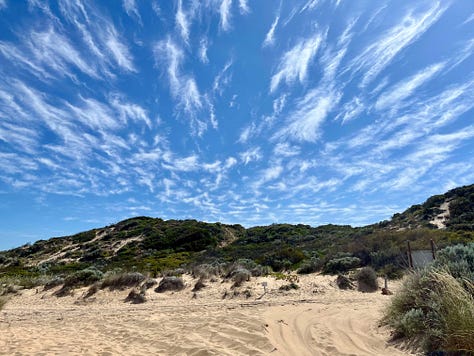
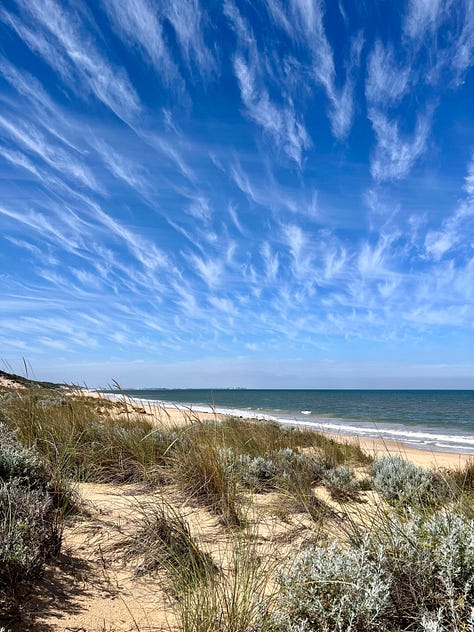
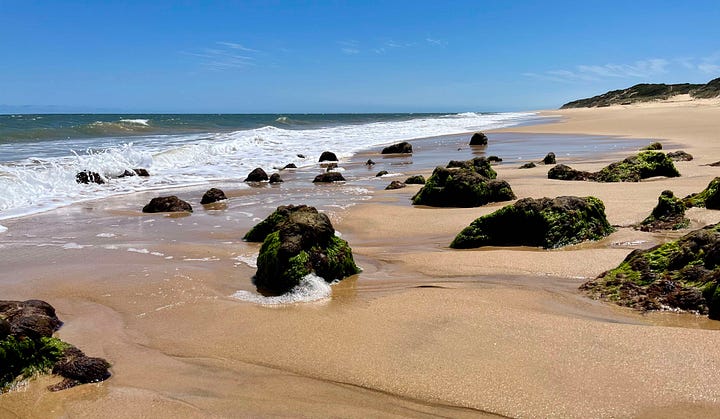
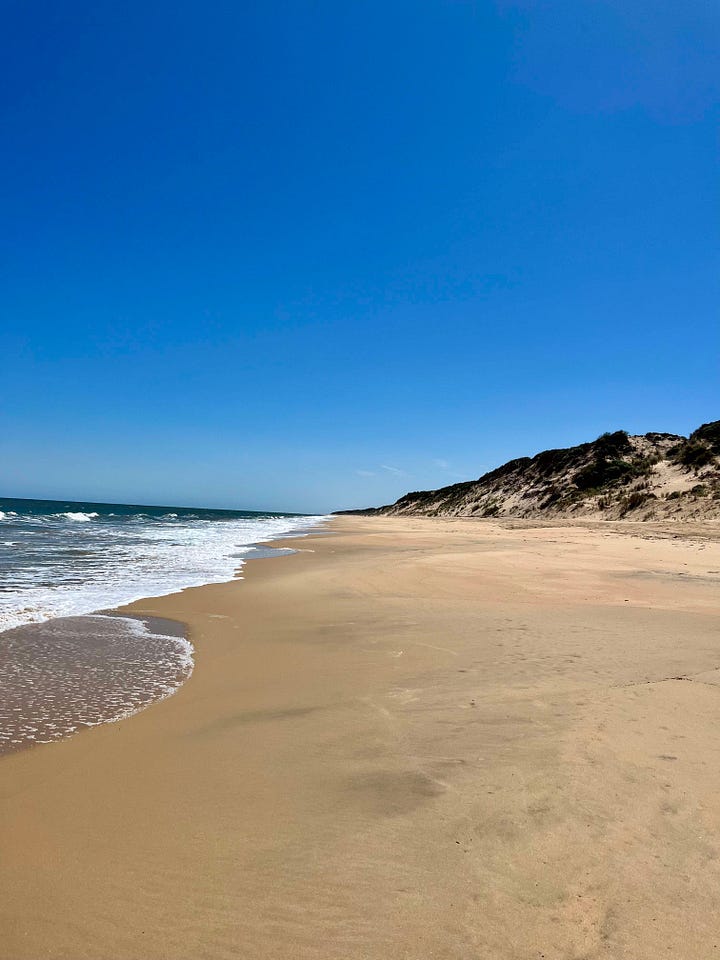
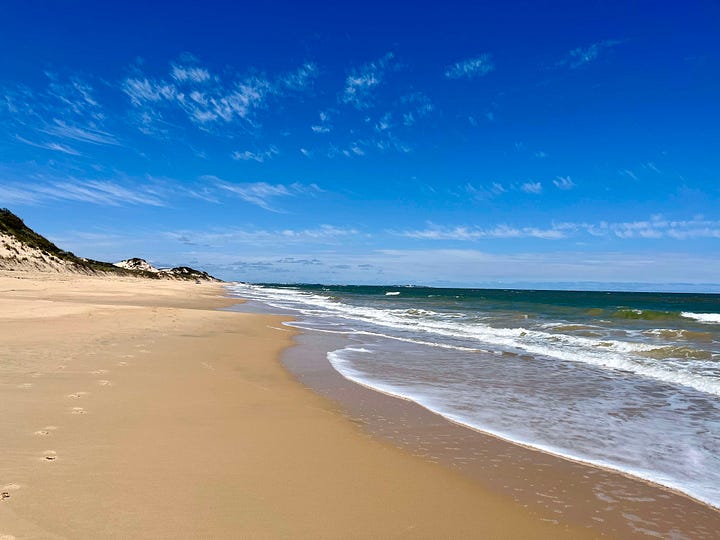
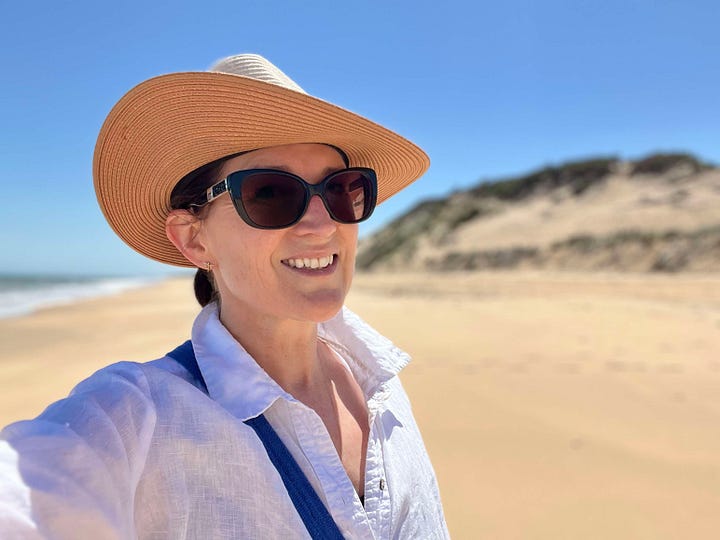
Walk 2 - Don Shepherd Nature Reserve
As is our habit on spring Sundays, we drive to our local bushland to walk with the wildflowers. As we lace our boots, a couple who is leaving tells us the trail was a bit disappointing. They didn’t see anything. It was boring, a waste of time.
Within the reserve, the great mass of colour has faded, but there are still orchids and other flowers to be found. Now is the time to find sun, leek and and leopard orchids, as well as Pixie Mops (petrophile) and sundew. And it is the time for spiders, who build webs everywhere this time of the year. We try not to break them when we bend to inspect a flower or insect or plant, but it is inevitable that sometimes we undo a spider’s meticulous work.
Red-tailed black cockatoos screech as pass through the bushland; a kangaroo stares for a moment before bounding away. At the end of the trail, we say hello to the emu that lives on the block beside a bridle trail, and then we make our way back.

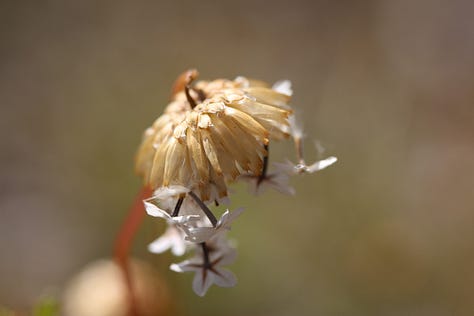
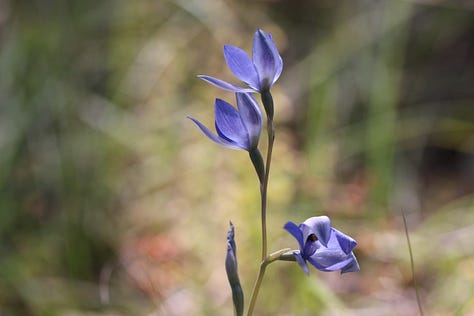


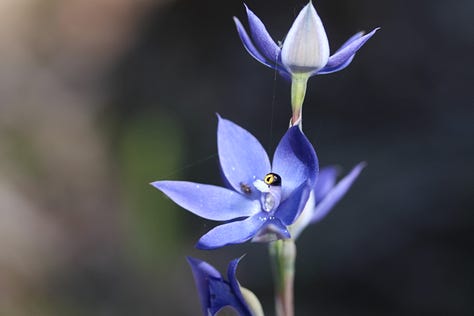
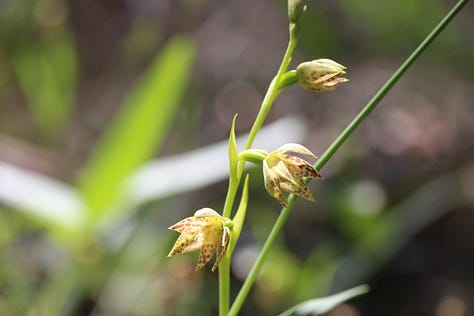
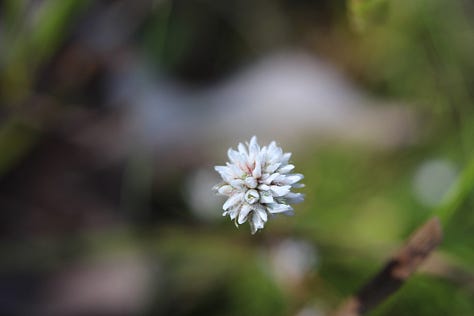
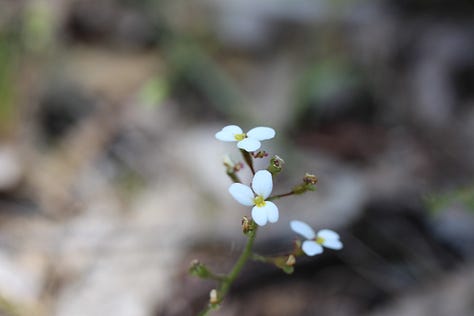
Later I look at my photos, marvelling anew at the shapes and colours of the flowers. And there is beauty too in the flowers that are past their glory - see this orchid, see how it resembles a woman lifting her face and chest to receive the sun.
Walk 3 - Don Shepherd Nature Reserve
Aaron has taken to walking barefoot along the inner track of the reserve - he wants to feel the earth under his feet. His steps are careful, but sure. He walks ahead of me, pulling out weeds, looking out for snakes, but there are none. And then, there is one. More than a metre long, dark brown in colour. It doesn’t stop to greet us, just slithers deeper into the bush, rustling a path under drying leaf litter. We have been walking in this patch of bush for years and have never once seen a snake. Later, there is another snake on the side of the road, undulating into the safety of drying grass; later, I dream of three tiger snakes wriggling up a steep sand dune.
We brush away spider webs that thread across the track, looking for orchids, finding only leek and leopard orchids now. But there are still so many surprises to be found as we pass through: flowers, birds, leaves, insects. Twice we have found chicken eggs (but never the chicken). Once a potato. A teabag left to dry in the branches of a tree. Today, someone has left a condom, the wrapper discarded beside it. It is as jarring to find as I suspect it is to read. We move on, find a feather; we stop to watch the black cockatoos screech at us. In the distance, a kookaburra laughs and laughs and laughs. We talk about being stewards of the earth, our community, our stories, our lives.
At home, I have started to delete photos from the thousands I have stored. The enormity of the job boggles my mind, but it is during this virtual decluttering that I discover we have been walking in this patch of bushland since 2010. Initially it was just a place to walk close to home. Now we go there to observe the passing of time.
To walk within time.
Found: Pink Summer (Calytrix fraseri), Mulla Mulla (Ptilotus exaltatus), Fringe lily (Thysanotus multiflorus), fading Kangaroo Paw.

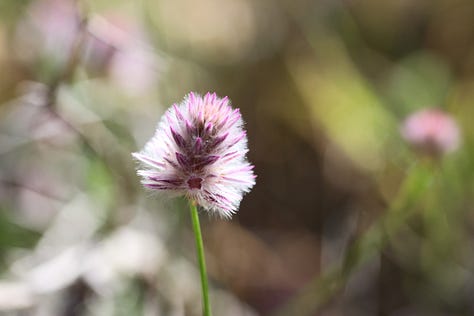
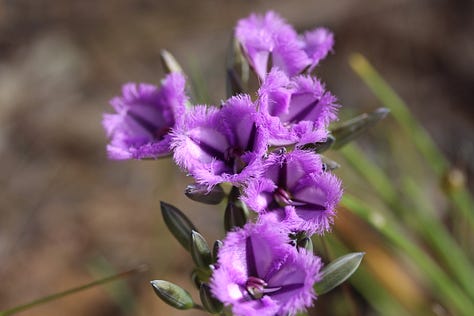

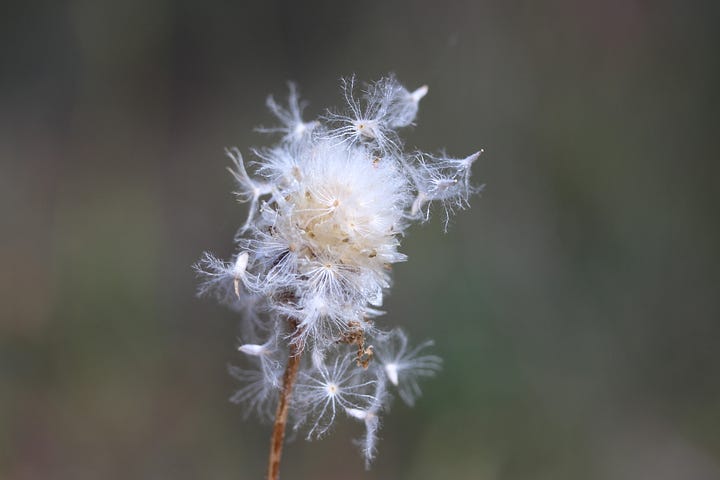
And then, we return home. Back to the proving sourdough that is ready to bake. To ingredients for a Burnt Basque Cheesecake that should be at room temperature by now. To an afternoon of pottering in the garden, reading, cooking, and an evening sharing dinner with the ones we love. Before we know it, it’s time to prepare for a week at work.
But while we walk in nature, time seems to stop, suspended like this leaf.
For more of my musings, you might like:
I said I'd never do this...
I think it was during a lockdown period in 2020 that we tried watching Great British Sewing Bee (Season 1). I say tried because we didn’t finish the episode. Boring, A pronounced, looking to me for confirmation that he could indeed switch to something more interesting. It hadn’t caught my interest either, so I wasn’t b…
La Muse: Pausing to Wonder is a gift of words and will continue to be free for all readers for the foreseeable future. However, if you feel led (and able) to support my writing financially, there are a couple of options: 1) Buy Me a Coffee, which is a one-time “tip” as a way to say thank you, or 2) subscribe at one of my paid tiers if you wish to provide ongoing support. You can also recommend my Substack to other readers.
Either way, I am grateful that you have chosen to be here today, to be part of my community of readers and writers pausing to wonder (and wander). Let's keep connecting as a community and building each other up.




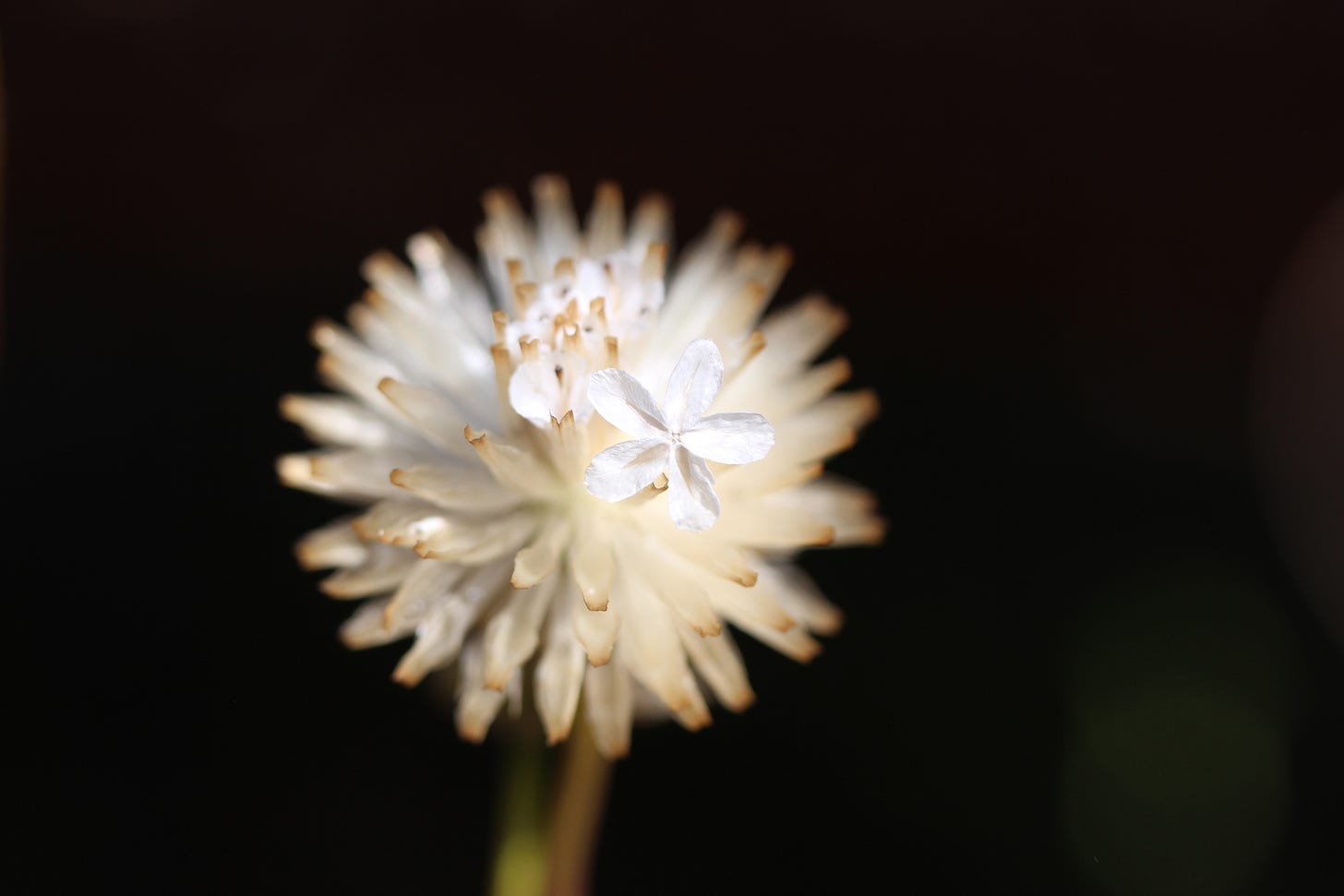
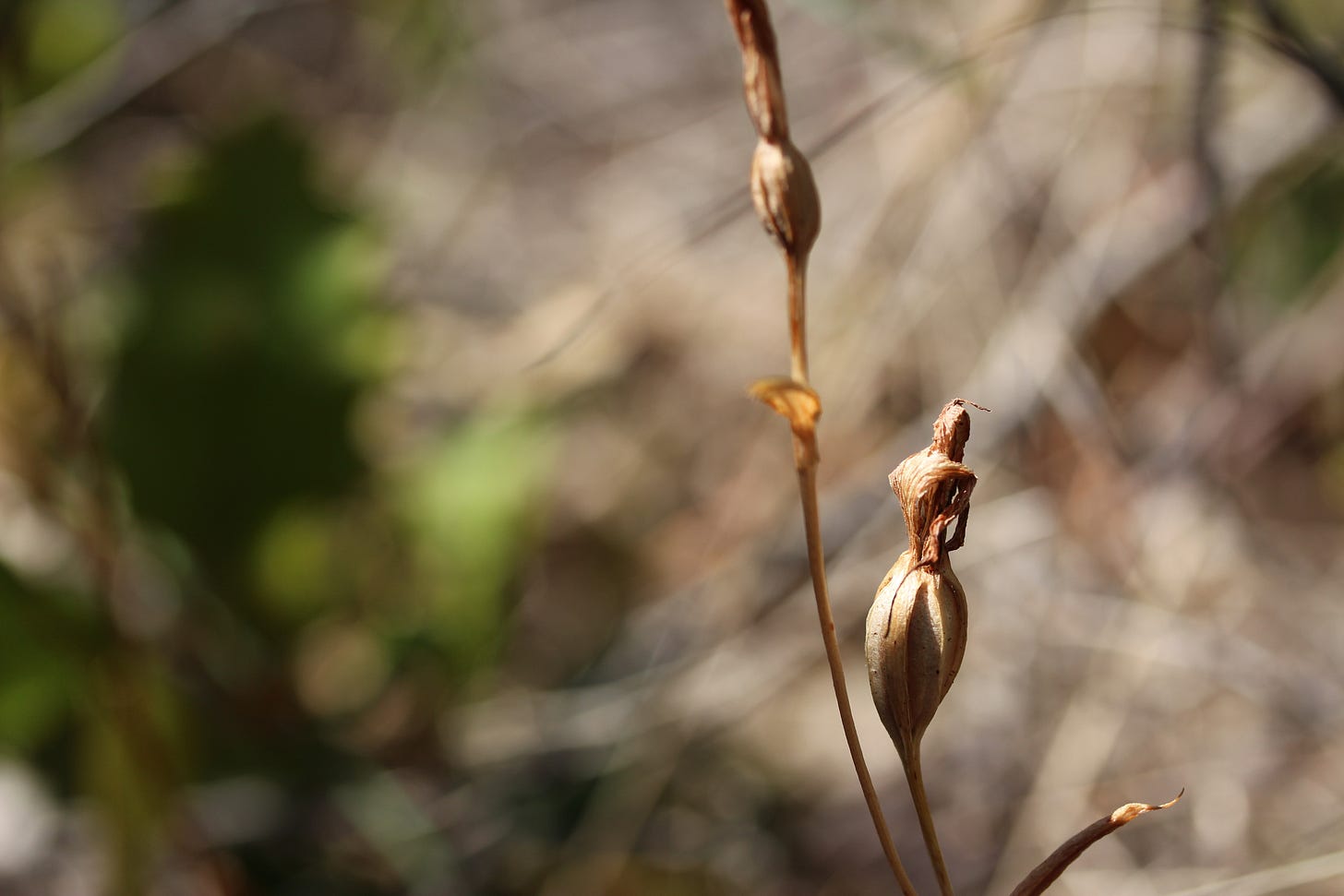



Beautiful Monique 🖤 your words and photos are truly stunning. Wishing you a wonderful Sunday!
Beautiful photos, Monique! I love your flower photos - the flora around you is truly beautiful! So different from where I live!
Thank you so much for sharing your walks and the Aboriginal proverb.
(Sorry for only commenting now - when I first read your post, I wasn't able to leave a comment, the button was greyed out... I wasn't sure if it was a glitch or if you had a paywall on the comment section, but decided to check again. And I am glad I did 😊)